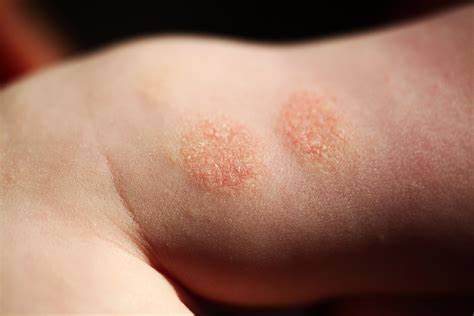Dry skin can indeed be a contributing factor in the development of eczema. Eczema, also known as atopic dermatitis, is a chronic skin condition characterized by red, itchy, and inflamed patches on the skin. While the exact cause of eczema is not fully understood, there are several factors that can trigger or worsen the condition, and dry skin is one of them.
Dry skin occurs when the skin loses its natural moisture and becomes dehydrated. This can happen for various reasons, such as low humidity, excessive bathing or showering, harsh soaps or detergents, cold weather, or certain medical conditions. When the skin lacks moisture, it becomes more susceptible to damage and irritation.
The outermost layer of the skin, called the stratum corneum, acts as a protective barrier against external irritants and allergens. It helps to retain moisture and prevent water loss from the deeper layers of the skin. However, when the skin is dry, this barrier is compromised, allowing irritants to penetrate more easily.
In the case of eczema, dry skin disrupts the skin barrier, making it more susceptible to allergens and irritants in the environment. These can include certain fabrics, chemicals, soaps, detergents, perfumes, or even sweat. When these substances come into contact with the skin, they can trigger an immune response, leading to inflammation and the characteristic symptoms of eczema.
Additionally, dry skin itself can cause itching, which further worsens the condition. Scratching the itchy skin can damage the skin's surface, creating small breaks or abrasions. These openings provide an entry point for bacteria and other microorganisms, leading to infection and further aggravation of eczema symptoms.
Moisturization is key to managing both dry skin and eczema. Regularly applying moisturizers helps replenish the skin's moisture content, strengthen the skin barrier, and reduce water loss. Look for moisturizers that are specifically formulated for sensitive or eczema-prone skin and avoid products that contain fragrances, dyes, or other potential irritants.
In addition to moisturizing, it is important to adopt other skincare practices that can help prevent and manage dry skin and eczema. Limiting bath or shower time and using lukewarm water instead of hot water can prevent excessive drying. Avoiding harsh soaps and opting for gentle cleansers can also help maintain the skin's natural moisture balance.
Humidifying the indoor environment, particularly during dry seasons or in regions with low humidity, can add moisture to the air and prevent excessive drying of the skin. Wearing breathable fabrics, such as cotton, and avoiding rough or scratchy materials can also reduce irritation.
If dry skin and eczema symptoms persist despite self-care measures, it is advisable to consult a dermatologist. They can provide a proper diagnosis, recommend suitable treatments, and prescribe medications, such as topical corticosteroids or immunomodulators, to alleviate symptoms and manage flare-ups.
In conclusion, while dry skin is not the sole cause of eczema, it can contribute to its development and exacerbation. Maintaining proper skin hydration through regular moisturization and adopting appropriate skincare practices are essential to managing dry skin and reducing the risk of eczema flare-ups.



No comments yet
Be the first to share your thoughts!